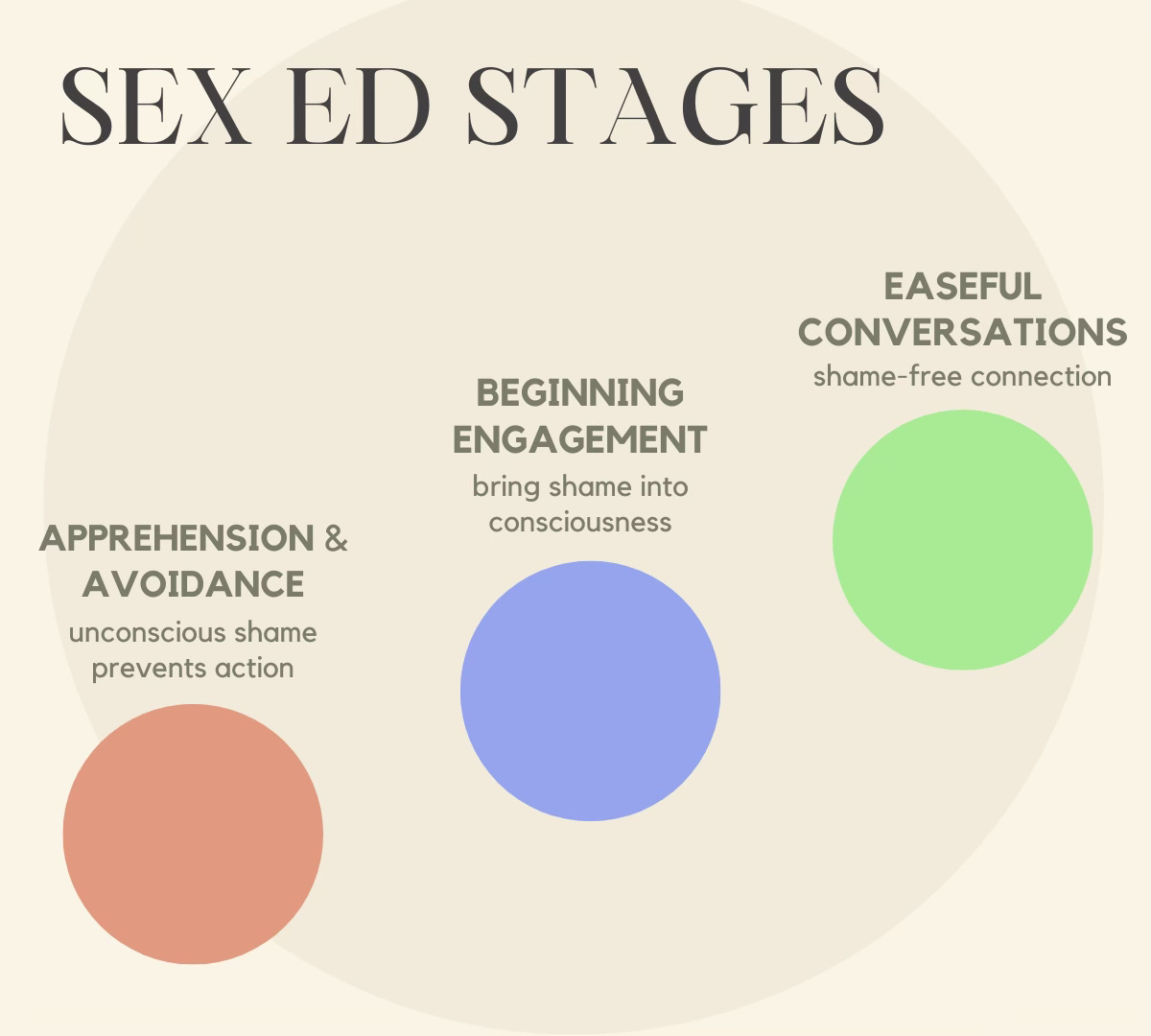When I first started teaching sexuality education to 6th graders in 2006, the transparency film would shiver as my shaking hand tried to orient the penis diagram on the overhead projector. My armpits would sweat, my voice would crack, and I felt like I might get in trouble (I still feel this way sometimes). The projector has been updated, but the social conditioning around sex ed still hijacks our nervous systems.
Sex ed can send our adult somatic bodies into a triggered state: tight throat, impatient, constricted body, a mild fight or flight response. Or maybe we avoid the topic altogether, being more of the fawn type. These are all common; honestly, I am no stranger to these feelings.
Over the years, I’ve been trying to figure out why staying calm and approaching sex ed with compassion and ease is so incredibly hard.
The parents I know are mature (mostly😉), thoughtful, kindhearted people who love their children beyond words. So, why does speaking about sexual wellness feel so unnerving?
Talking about sexual health with children, or even with adults, can feel like taking a cold shower, with the fear of someone watching. Our amygdala lights on fire, silently commanding us to “get the hell out, now” or “this is WRONG - stop.” Or it whispers a silent threat, “Someone may find out you talked about this. What will they say? What will they think?”
Please know that sheer willpower will not alleviate these thoughts and feelings. We live in a web of relationships, including family, friendships, organizations, cultures, and subcultures that co-create our experience. Society's stronghold is mighty.
There’s kind of a universal “ick” for parents, teachers, and caregivers around teaching sexuality education to children. But, there doesn’t have to be. If we can identify the root cause, we can begin to alleviate the discomfort.
So, where exactly does the ‘ick’ come from?
SHAME
Shame is an invisible force that moves people away from action. It can control behavior, minimize, shut down, and dictate policies. Shame has a dismissive quality, saying a person's feelings are unimportant.
Shame is the lowest vibrational energy we can carry.
We have inherited generational shame.
Maybe epigenetics is involved, I don’t know. But one thing is for sure: the shame we feel around sexuality is long-standing, deeply rooted, and pervasive.
The history of sexuality education is steeped in shame and politics.
Shame is a primary weapon for anti-abortion rhetoric. Abortion is health care, and yet, even pro-abortion women can still carry shame.
Women, we know shame for all sorts of reasons.
Dearest Queer Community, I don’t think a black hole could engulf all the shame you’ve been forced to endure. I see you.
Shame is a core issue for many men.
Religion and shame are close acquaintances.
Welp, it seems that shame affects us all; it is a universal emotional experience.1 None of us can escape this big bully, but we could try to befriend this painful emotion and free ourselves a little, creating a greater capacity for acceptance and love.
What I Learned from The Shame Clinic
In 2020, my husband and I took a course called The Shame Clinic, taught by David Bedrick and Simon Seoul, two incredible teachers who look at the world deeply. (Unfortunately, I don’t think the course is available online anymore).
As I explored my issues with shame, trying to quiet the recurring voice of my mother shouting, “Shame on you!” I could not help but apply the learning to my sex ed work.
Culture uses sexuality shame to oppress. Children absorb shaming messages early, unintentionally. If we shine our light on shame and say, “I’m sorry, shame, you are not welcome here; you must leave now,” we can clear the way for a new paradigm.
I invite you to unshame sexuality education.
I want to share a helpful chart adapted from The Shame Clinic:
David Bedrick Shared 3 Keys to Healing Shame
Seeing - bearing loving witness to shame. When a person feels shame, constricted, and low, shine a soft light on that feeling.
Feeling - when another person feels compassion for a person's shame, it brings legitimacy to the experience and gives it life, so that it may heal
Believing - a deep radical belief that a person’s truth has beauty and intelligence and is worthy of our best support.
If these concepts strike a deep chord with you, I recommend exploring David Bedrick’s work. He is a special soul.
3 Stages of Parent-Led Sexuality Education
In the meantime, let’s vibrate higher and build a sexuality education approach that humanizes the beauty, power, and intelligence of sexual well-being.
The first step toward change is awareness. Let’s be aware that we inflict unconscious shame on our children. We are not monsters; we are human.
The next stage is acceptance and a willingness to work with our discomfort. Opening a sex ed book and reading it with your child while your voice shakes and you silently want to run away means you are on the right track.
The third stage is a safe, trusting relationship with your child built on respectful, often easeful conversations. Caregivers may find that two-sided vulnerable talks help build a strong relationship well beyond the sexual health topics.
Please don’t be fooled into thinking this is a linear process, and once you have an easy conversation, you’ve mastered sex ed. Shame is a cancerous bully that can smack us around, trying to force us into feeling inadequate or wrong.
You, dear parents, are leaders in your home and you have the power to unshame sexuality education.
I believe in you.
xo
Tara
One of my 5 year olds started saying “welp” and I melt each time he says it, so I’m imitating him.🩷







